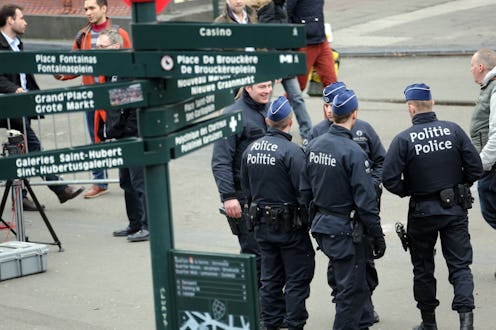On Monday morning, Belgian federal prosecutors announced that three additional people were being held for terrorist activity. The three men, who are being referred to as Yassine A., Mohamed B. and Aboubaker O., were found during a series of 13 police raids in northern neighborhoods of Brussels. A fourth man was detained as well, but let go without charges. Federal prosecutors have not confirmed whether these men were involved in the three bombs set off in a Brussels airport and metro station last Tuesday. After four victims died in the hospital Sunday night, the death toll has risen to 35. Hundreds were injured in the three attacks, for which ISIS has since claimed responsibility.
Belgian authorities believe that five men, three of whom are dead, directly took part in the bombings. Two have yet to be identified. In the days following the attack, at least a dozen people have been detained in Belgium, France, Germany, Italy, and the Netherlands. As the days drag on, the search for these terrorists and supposed ISIS members intensifies. Faycal Cheffou, however, is the only person who has been officially charged in connection with the bombings. The public has not been told whether he is the man in the photo from the Zaventem CCTV footage.
The widespread nature of the search, paired with the fact it took nearly four months to arrest Paris attack mastermind Salah Abdeslam in Brussels' Molenbeek neighborhood (a known terrorist hot spot), has shed an unattractive light on intelligence sharing between European countries. Abdeslam was arrested the Friday before the Brussels attacks. One man named Najim Laachraoui, who is a suspect in the Brussels bombings, had already been on authorities' "wanted" list the day prior to the atrocity. Now that almost a week has passed, there are mounting suspicions that the attack could have been prevented if each country communicated local threats more efficiently.
In an interview with NPR's Daniel Zwerdling, Jeremy Shapiro, research director at the European Council on Foreign Relations in London, said that the European Union needs to become better at foreseeing and stopping attacks. For example, Europe doesn't have a passenger name record system to track who's buying tickets to and from Syria. He explained how civil liberties complicate most surveillance methods, which makes it difficult to implement protective yet restrictive policies:
I guess what I'm less optimistic about is that we will find a way to get the societies to respond in a way which is reasonable ... And instead, we will constantly be introducing new surveillance, new security measures, new restrictions on civil liberties intended to reduce this problem to zero when that's really just not possible.
EU foreign ministers met in January a couple of months after the Paris attacks and spoke on the importance of sharing information concerning potential terrorists with each other. Now that the search for people involved in the Brussels bombings has extended throughout several nations, such connections are an absolute necessity.
